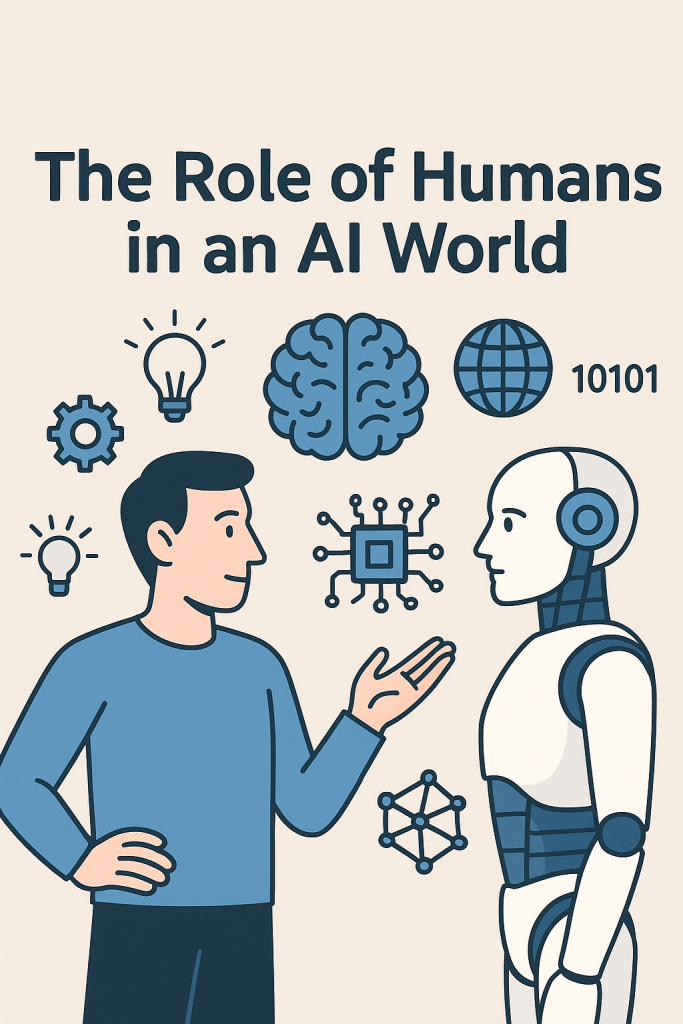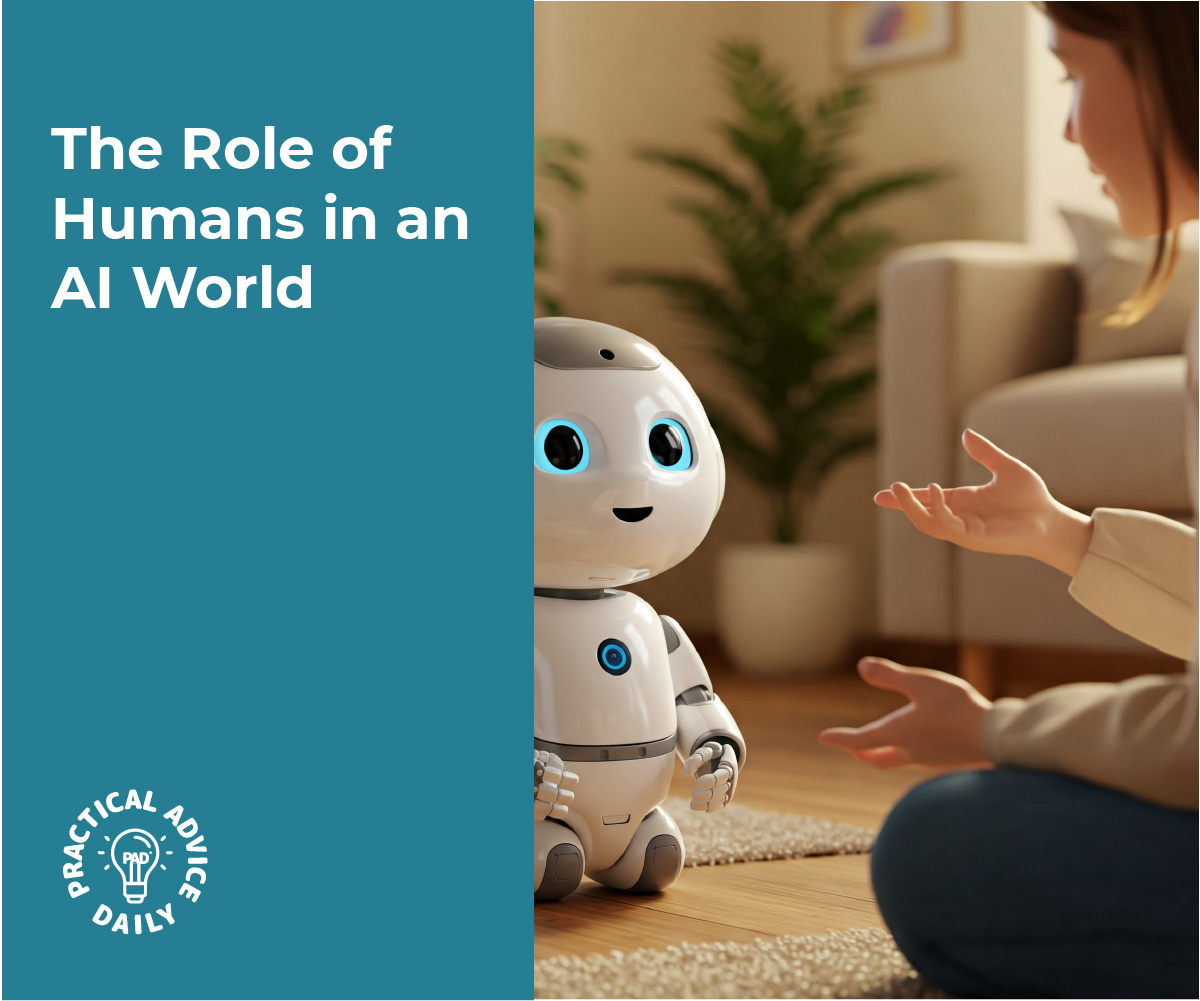You’ve probably heard a lot about artificial intelligence, or AI. It seems to be popping up everywhere—from voice assistants to smart tools that help us shop, drive, or even write. While AI can be helpful, some people worry it might replace human jobs or make our skills less valuable.
But here’s the good news: AI may be powerful, but it can’t do everything. In fact, your human abilities—like thinking clearly, being creative, and showing kindness—are more important than ever. This article will show you how humans and AI can work together, and why your skills still matter in this new tech-driven world.
Table of Contents
Key Takeaways
- AI can do many tasks, but it lacks human traits like empathy, creativity, and moral judgment.
- Human roles will shift toward tasks that require understanding, problem-solving, and care.
- Learning how to work with AI—not compete against it—is the key to staying confident and relevant.
- Everyday people, especially older adults, bring life experience that AI simply can’t replicate.
Understanding What AI Can and Can’t Do
Let’s start by clarifying what AI really is. AI is a type of technology that lets machines “learn” from data and perform tasks—like sorting emails, recognizing speech, or even predicting the weather.
But AI is not magic. It doesn’t truly understand, feel, or care. It’s trained to follow patterns based on information it has been given.
Here’s a simple way to look at it:
- What AI can do:
- Calculate and analyze large amounts of data
- Automate repetitive tasks (like organizing files)
- Recognize faces, speech, or patterns
- Calculate and analyze large amounts of data
- What AI can’t do:
- Show emotions or empathy
- Make moral or ethical decisions
- Understand context the way humans do
- Think creatively or “outside the box”
- Show emotions or empathy
AI is like a helpful tool—but one that still needs a human hand to guide it.

Human Skills That Can’t Be Replaced
1. Creativity
AI can help write music or suggest headlines, but true creativity comes from human experience, emotion, and inspiration. A machine might copy a style, but it can’t dream up a brand-new idea based on personal memories or feelings.
Example: A grandmother’s secret recipe passed down through generations isn’t just ingredients—it’s love, culture, and memory. That’s something only a human can share.
2. Empathy and Emotional Understanding
When someone is going through a tough time, they need a kind word or a listening ear. AI doesn’t feel emotions and can’t offer real comfort or understanding the way people can.
Example: A nurse holding a patient’s hand before surgery does something no machine can replicate: offering warmth and connection in a scary moment.
3. Judgment and Wisdom
With age comes experience. Humans can use wisdom to make complex decisions, especially in uncertain situations. AI relies on data—but not everything in life follows a formula.
Example: Choosing the right moment to talk to a loved one about a sensitive topic requires timing, care, and understanding—not something you can program.
4. Adaptability and Common Sense
Life is full of surprises. When something unexpected happens, humans can adjust and make quick choices based on context. AI often struggles when things don’t go according to plan.
How Humans and AI Can Work Together
Rather than seeing AI as a threat, think of it as a partner. You don’t need to become a tech expert—but knowing how AI works can help you stay in control and use it to your advantage.
Here are a few ways people are combining their human skills with AI tools:
- Writers use AI to brainstorm ideas, but they still write with personal voice and feeling.
- Doctors use AI to help spot medical issues, but they make the final call with their own judgment.
- Teachers use AI-powered apps for practice exercises, but real learning happens through human guidance and support.
This shows a powerful truth: AI may assist, but people lead.
What This Means for You
If you’re not a tech-savvy person, don’t worry. You don’t have to become an expert in coding or robotics. Just being curious, open-minded, and willing to learn a little can go a long way.
- You might try using voice assistants for reminders or directions.
- You could explore a hobby app that helps you garden, cook, or play music.
- You can help younger family members think about how to use technology wisely.
And remember—your life experience, perspective, and care are valuable. AI can’t replace your role in your family, your community, or your world.
Final Thoughts
In a world full of smart machines, human strengths still shine the brightest. Your ability to care, create, decide, and adapt makes you irreplaceable. As technology grows, it’s not about humans vs. AI—it’s about how we work together.
Whether you’re learning something new or helping someone else along the way, your human touch will always matter. So stay curious, stay confident—and know that your skills are here to stay.
